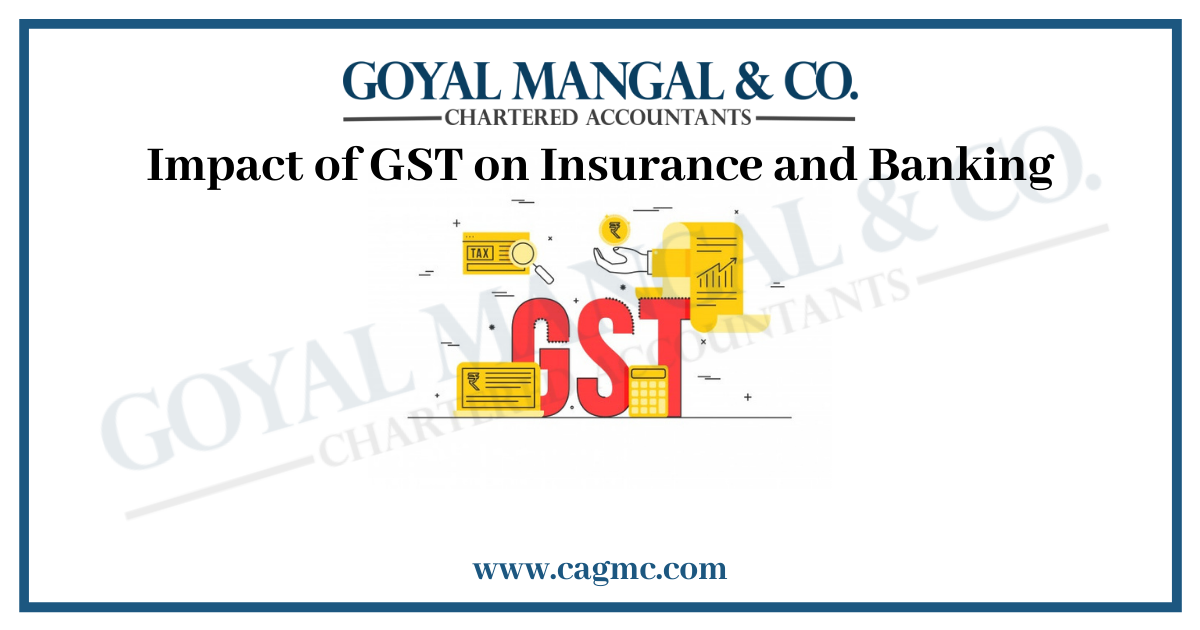Life is unpredictable and full of uncertainties and no one knows when something unfortunate happens. Such unpredictable circumstances also bring with it several legal and financial issues that one has to face in case there is no insurance policy. People prefer to have different types of insurance policies be it health, home, vehicle, business, personal accident insurance and even life insurance. This means they would have to pay multiple premiums for each policy separately. With the implementation of the Goods and Service Tax in India, the amount paid as insurance premium for these policies has also been affected. This article explains the impact of GST on insurance premiums and Banking Sector.
| Contents |
Insurance
A. Life Insurance and Health Insurance:
There are three types of life and health insurance policies. These are as follows:
- Term insurance plans– These are basic life insurance policies
- ULIP(Unit linked insurance plan)– It is a multi-faceted life insurance plan under a single integrated plan that requires a policyholder to make regular payments and a part of which is used to provide life insurance coverage.
- Endowments (including money-back)– It is a life insurance policy that pay a lump sum on maturity/death or a fixed sum every month (sort of like a pension)

The Service tax applicability was different on each type of plan – For example, ICICI Prudential Life Insurance applied service tax at the following rates:
| Category | Service Tax With SBC And KKC | After GST |
| Term insurance premium | 15% | 18% |
| ULIP charges | 15% | 18% |
| Health insurance premium | 15% | 18% |
The above rates are replaced by 18% due to which there is an increase in premiums. In relation to life insurance business, the value of supply of services shall be:
a) The gross premium less the quantity allocated for investment, or savings on behalf of the policyholder, if such quantity is informed to the policyholder. For instance,
| Particulars | Service Tax | GST |
| Gross Premium | 2000 | 2000 |
| Investment Portion | 1200 | 1200 |
| Life Insurance portion | 800 | 800 |
| Service tax @ 15% on 800 | 120 | —– |
| GST @18% on 800 | —– | 144 |
b) Single premium annuity policies- 10% of the premium
c) All alternative cases- 25% for 1st year and 12.5% for 2nd year forward on the premium charged.
|
Gross Premium per annum |
2000 |
| 1st Year | |
| 25% of value | 500 |
| GST @18% on 500 | 90 |
| 2nd year | |
| 12.5% of value | 250 |
| GST @18% on 250 | 45 |
d) If the whole premium is for life insurance, GST @18% are applicable on the whole premium. Both existing and new policyholders can face an increment within the premium amounts because of increase in tax rates. For insurers, the increase in taxes is passed on to the customers. The insurers expect higher compliance and administrative costs because of the increased range of GST returns and also effect of taxability of inter-branch services.
B. General Insurance
It contains fire insurance, marine insurance, car insurance, theft insurance, etc. The GST rate that applicable on general insurance is 18%. Corporate policyholders can enjoy input tax credit (ITC) on the GST paid on their general insurance policies (it was available to them even under service tax). For policyholders, the general insurance premium has increased as tax has increased from 15 to 18%.Life and health insurers will not get input tax credit because it is not available for life and health insurances for personal purposes.
Life insurance provided by Government schemes are exempted from GST:
- Janashree Bima Yojana (JBY)
- Aam Aadmi Bima Yojana (AABY)
- Life micro-insurance product as approved by the Insurance Regulatory and Development Authority, having maximum cover of Rs. 50,000
- Varishtha Pension BimaYojana
- Pradhan Mantri Jeevan Jyoti BimaYojana
- Pradhan Mantri Jan Dhan Yogana
- Pradhan Mantri Vaya Vandan Yojana
- Any other insurance scheme of the State Government as may be notified by Government of India on the recommendation of GSTC.
- Life insurance provided by Central Government to members of the Army, Navy and Air Force.
Banking
Under Service Tax, the applicable rate was 15% on banking services which increased to 18% under GST. Like insurance, banking services has become more expensive to the customers due to rise in tax rates. In most of the banks, they have started applying transaction charges on cash withdrawals from different bank ATMs, cash withdrawals from branch (first 5 for both are free). All these attracted 15% under service tax which raised to 18% under GST regime.
Banking Companies
Banking companies will pass on the tax liability to their customers but their administrative and compliance work will rise tremendously. Branches give services to each other which will be taxable under GST (they can later claim input tax credit). Due to this, the paperwork will increase and therefore the operating costs. Good news for business consumers as they can now claim input tax credit on the banking services paid on their business accounts.
Conclusion
All policyholders will have face higher premiums on their insurance due to increment in GST rates. A middle class family with life, health and car insurance will find an increment of 3% on their insurance expenses. Assuming they spend a total of Rs. 10,000 per year on insurance excluding service tax their expenses will increase by 3% i.e., Rs. 300.


